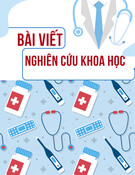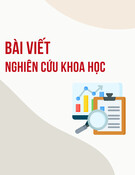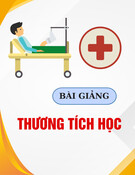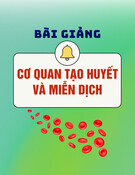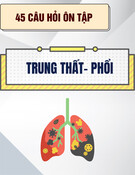
34
Journal of Medicine and Pharmacy, Volume 13, No.04, June-2023
Corresponding author: Dang Thi Anh Thu, email: dtathu@huemed-univ.edu.vn
Recieved: 7/12/2022; Accepted: 3/4/2023; Published: 10/6/2023
DOI: 10.34071/jmp.2023.4.5
Knowledge and practice in respect of medical solid waste
management among healthcare workers at Quang Nam Northern
Mountainous Region General Hospital
Nguyen Cong Xinh1, Tran Van Vui2, Nguyen Thi Dang Thu2, Dang Thi Anh Thu2*
(1) Quang Nam Northern Mountainous Region General Hospital
(2) Hue University of Medicine and Pharmacy, Hue University
Abstract
Background: Proper management of medical solid waste (MSW) is a complex global challenge that affects
healthcare workers (HW), patients, and the environment. This study aims to evaluate the knowledge and
practices of HW regarding MSW management and explore the factors associated with their knowledge and
practices at the Quang Nam Northern Mountainous Region General Hospital in 2020. Materials and method:
A cross-sectional study was conducted on 478 HW from June to December 2020. A self-administered
questionnaire was used to collect general and knowledge information, while a checklist was used to
assess their practices. Multivariate logistic regressions were conducted to identify the factors associated
with knowledge and practices. Results: Out of the 478 respondents, 71.1% had good general knowledge,
and 75.9% had good practices regarding MSW management. Multivariate logistic regressions showed that
knowledge was significantly associated with age group (OR = 14.69; 95%CI = 5.87 - 36.77 and OR = 44.26;
95%CI = 12.04 - 162.74, p < 0.001), occupation (OR = 22.78; 95%CI = 4.39 - 118.38 and OR = 18.09; 95%CI =
3.81 - 85.90, p < 0.001), training courses (OR = 0.21; 95%CI = 0.09 - 0.45 and OR = 0.24; 95%CI = 0.09 - 0.65,
p < 0.05), and frequency of MSW monitoring activity (OR = 5.08; 95%CI = 2.18 - 10.87, p < 0.001). Similarly,
practices were significantly associated with age group (OR = 3.36; 95%CI = 1.35 - 8.38, p < 0.05), working
experience (OR = 0.49; 95%CI = 0.25 - 0.94, p < 0.05), and frequency of MSW monitoring activity (OR = 2.81;
95%CI = 1.63 - 4.85, p < 0.001). Furthermore, a positive association was observed between knowledge and
practices regarding MSW management. Conclusion: Overall, the study found that the respondents had good
knowledge and practices regarding MSW management. To maintain and improve this, the hospital should
provide further training courses on MSW, ensure proper monitoring and supervision of managers and HW.
Keywords: medical solid waste management, knowledge, practice.
1. INTRODUCTION
Medical solid waste (MSW) poses a significant
threat to human health and the environment due to
its potentially hazardous germs and risk of infection
transmission [1]. To prevent harmful consequences,
proper MSW management is needed, which
entails managing waste from generation, through
separation, collection, transport, and treatment to
their final disposal. According to the World Health
Organization, there were about 5% of hazardous
waste and 10% of the potentially infectious hazardous
waste which account for approximately 10% - 25%
of the total amount of MSW [2]. In Vietnam, medical
facilities have generated a considerable amount of
MSW, especially hazardous waste. The Environment
Protection Report 2019 of the Vietnam Ministry of
Health showed the average amount of MSW was
more than 96 thousand tons/year and the total
amount of hazardous waste was over 24 thousand
tons/year [3]. According to the results of The
medical waste management Report in 2020 of the
Quang Nam Northern mountainous region general
Hospital, a grade II hospital, the total amount of MSW
generated was more than 1,300 tons/year including
49 tons/year of infectious MSW and 1.4 tons/year
of non-infectious MSW [4]. In addition, inadequate
risk awareness and training, and lack of knowledge
and practice in management, treatment, collection,
and classification of MSW among HW are key factors
leading to the mismanagement of infectious waste.
Several studies conducted in Vietnam indicated HW
have varying levels of knowledge and practice when
it comes to MSW management. The studies report
that the proportion of HW with good knowledge
ranged from 45.4% to 78% [5-11], while the rate of
good practice on MSW management ranged from
74.4% to 92.5% [8, 12, 13]. Although recent efforts
have been made to improve MSW management,






